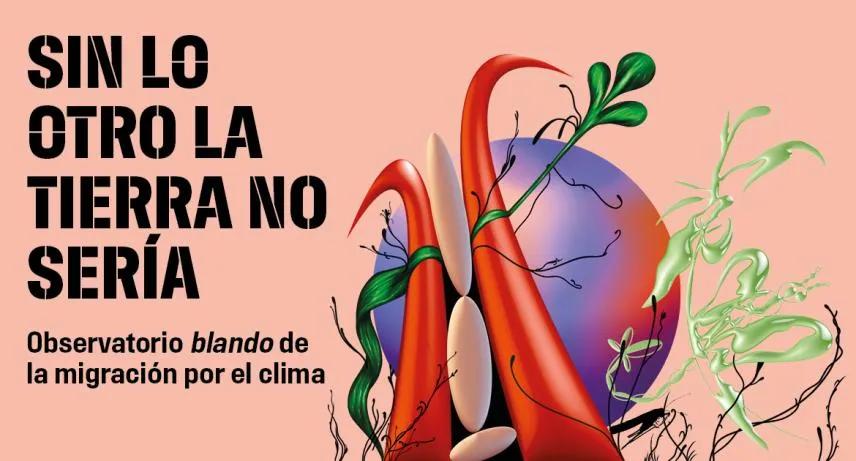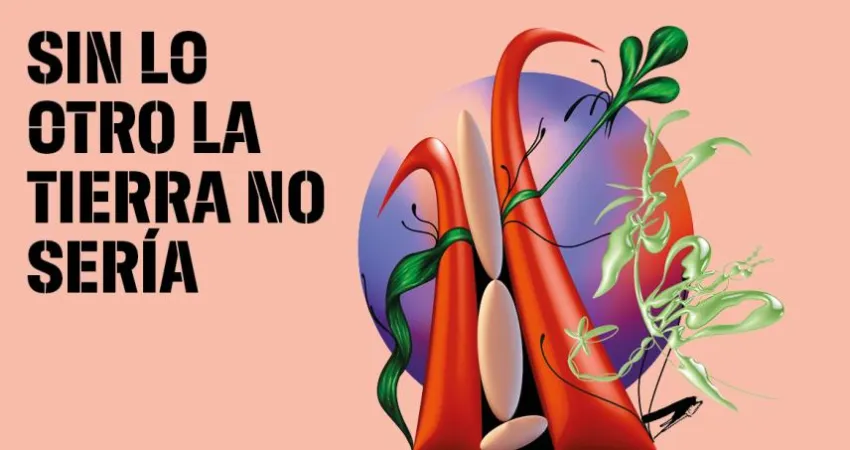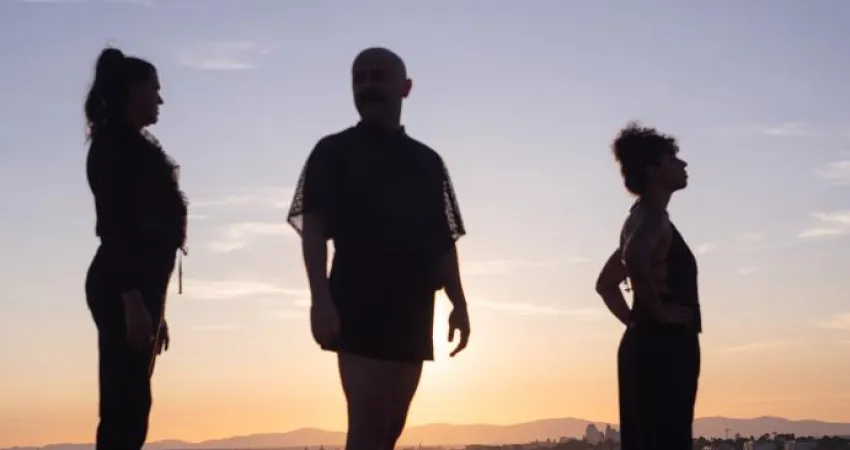Sin lo otro la Tierra no sería / Observatory of Climate Migration
Fecha
Thursday 17 and Friday 18 October
Local
La Nave
Horario
from 5pm.
Precio
Thursday 17 October from 5pm.
Extractivism, Territoriality and Legal Frameworks
Through the research carried out by Datadista, the narrative of Jornaleras de Huelva en Lucha (Day Labourers of Huelva on Strike), the interweaving of Benia Nsi Ngua, Emily Sun and Iren Márquez Dos Santos with Marisa Cámara, and the collaboration between Júlia Nueno Guitart and Riders x Derechos (Riders x Rights), we will explore different experiences of how a territory, its inhabitants and workers can be subjugated by the system's permissiveness regarding the exploitation of resources and people. These groups will unravel their demands, forms of organisation and tools to articulate dissidence, resistance and provocation as channels of struggle. The session will end with Javier Rodríguez who will take us on a sound and visual walk through a potential collective subconscious that runs through the narration of a four-day climatic-hallucinatory journey last August.
Friday 18 October from 5pm.
Modelling, Simulation and Oral Records
This session takes the form of a meeting of initiatives that address the commons from different angles as a way of building collective power and imagining other identities and representations. A journey through different research based on the word will allow us to appreciate the value of narrative in defining the present, but also as a means to connect with learning from the past and to outline other futures. Through the research of the Barcelona Supercomputing Center, the formulations of Nerea Calvillo, the travels of Nicolás Vizcaíno, the speculations of Xiaoji Song and the archival power of the Majazz Project: Palestinian Sound Archive, we will learn from the air, from interviews, from song and from the lakes as devices of knowledge that inform the most highly sophisticated computational technologies or to educate resistance in moments of crisis.
"And that is why there is night life. Another city for another life, but already immanent to this city, in its shadows.”
Raving, McKenzie Wark
Marina Garcés says that “being able to promise is precisely what makes us equal” and that “a condition of emancipation is being able to be the subject of one’s word and its consequences, together with others.” Together with others. I’m still not quite sure that I understand everything that Marina talks about in her short book, The Time of the Promise (El tiempo de la promesa), but even so, I can’t help but feel that much of the content of this programme, which I started working on long before I read her book, is held together by the power of promise. When I met Maria Teresa Vicente, the intellectual author of the law that gave legal personality to the Mar Menor, I promised myself that I would hold on tight to that inspiration. Today I can understand that the strength of that group of women activists, which led them to make that Popular Legal Initiative possible, may well have been due to the fact that they were driven in some way by the promise they made to themselves, to their neighbours, and to the lagoon. “A promise is not a speech, it’s an action of the word, apparently very simple, that awakens silences and redefines the limits of what is possible, with all the force of a truth against reality”.
It has taken two years to complete this project. In that time, we have witnessed some of the most brutal episodes of planetary geopolitics, episodes that reveal the injustice of ways of inhabiting that involve domination. Overwrought with frustration, I set out to look for groups that are doing things differently. I felt driven by an impulse to try to break free from a phase of theoretical thinking and speculation and to bring about reconciliation through action and effective change. Sin lo otro la Tierra no sería is a process of searching for cases that allow us to come back down to earth and to recover the capacity to imagine through doing. “There is no delirium in promise: there is daring, a form of presence that transcends the limits of the present and the known narratives of history.” In the end, the practices that we have compiled here as a sample of what is already being done are powerful exercises in radical imagination that transcend the limits of the present. All of these initiatives are driven by the need to address collectivity. They all operate from the periphery, where the other is.
This gentle observatory is a journey through active exercises in the material condition of the very concrete realities we are experiencing. They are organised around the three dimensions explored by the residency projects in September to illustrate perspectives on what is already happening. It is gentle because it problematizes the very categorisation of climate migration and the tensions that exist between the conditions it brings together. It is gentle because it does not bring together the obvious that is observed and that ends up defining this type of study, but rather presents perspectives and experiences that create these displacements but are not usually taken into consideration in the articulation of the systems that organise us.
- María Buey González -
Sin lo otro la Tierra no sería continues an Intermediae Matadero Madrid programme, which in recent years has promoted new discourses and practices related to ecology and the climate crisis.
DATADISTA is an independent media outlet, winner of several national and international awards and specialising in investigative journalism based on data and fieldwork. Its aim is to provide clear and verified information to empower citizens to make informed decisions. We are committed to transparency and accountability and to reporting that always strives to present honest and useful information.
Border Forensics (BF) is an agency mobilising innovative methods of spatial and visual analysis to investigate practices of border violence, wherever this violence might take place. Working collaboratively with migrant communities and non-governmental groups, Border Forensics produces human rights reports, maps, video reconstructions and other visualisations that ground demands of accountability for the violation of migrants’ rights and support claims for the identification of the deceased. Their findings have been presented in national and international courts, discussed in parliaments and political assemblies of various kinds, published in the international press and academic journals, and featured in exhibitions and public events.
Border Forensics recently published their investigation "The Nador-Melilla border trap" that focuses on the violent repression inflicted on migrants on the 24th June 2022 and the conditions that led to this massacre.
Nerea Calvillo is a researcher in the field of architecture. She is interested in the politics of the toxic, pollen, and queer urban political ecologies through spatial design, feminist technoscience studies, ecofeminisms and queer theories. She works at the Centre for Interdisciplinary Methodologies (UK), and is the founder of C+ Architects and of In the Air, an air quality visualisation project. She is also the author of Aeropolis: Queering Air in Toxicpolluted Worlds.
Palestinian Sound Archive is a celebration of music, spoken word and album artwork from historic Palestine, mainly from the 1960s – 1990s. It is part of Majazz Project, a Palestinian-led record label and research platform founded by actor, director and filmmaker Mo’min Swaitat in 2020.
ver several years, Swaitat amassed an extensive archive of cassettes and vinyl records from Palestine and beyond, spanning everything from field recordings of Bedouin weddings to revolutionary albums from the First and Second Intifadas, instrumental tracks, poetry, soul, folk songs and jazz. Many of these were acquired from a former record label in Swaitat’s hometown Jenin, in the north of the West Bank.
Palestinian Sound Archive was born out of the archive and is focused on sampling, remixing and reissuing vintage Palestinian and Arab albums, shedding new light on the richness and diversity of Palestinian and Arab cultural and musical heritage.
Swaitat comes from a long line of Bedouin musicians and storytellers, and the archive references his rootedness in music as a means of celebrating one’s culture and sense of belonging. He plays everything from jazz to funk, soul to dabke, field recordings to spoken word, and folk to electronic music from Palestine, the broader region and across the Global South.
Jornaleras de Huelva en Lucha Ana Pinto Lepe, was born in Escacena del Campo, a village of some 2,000 inhabitants in the province of Huelva. She is 37 years old. When she was 32, after having worked as a day labourer in the fields for 16 years, and thanks to the complaints of her Moroccan colleagues, she decided to organise herself and other workers to fight for their rights, which were being increasingly violated. In 2020, they set up Day Labourers of Huelva on Strike, an organisation made up of the same women workers, which has managed to put the spotlight on the abusive situation that prevails in the sector.
Day Labourers of Huelva on Strike is a self-organised group of women who work in the fields picking fruit and vegetables, based in the province of Huelva, Andalusia.
United in the fight for their rights and the achievement of decent living and working conditions for the day labourer class, they base their work on feminism, environmentalism and anti-racism, in a determined effort to put an end to decades of precariousness and oppression.
Carmen Gonzalez Romero / Barcelona Supercomputing Centre - National Supercomputing Centre
The BSC - CNS, one of Europe's leading supercomputing centres, is home to one of the world’s most powerful supercomputers, the MareNostrum 5. The Centre specialises in High Performance Computing (HPC) and has a dual function: to provide supercomputing infrastructure and services to Spanish and European scientists, and to generate knowledge and technology that can be transferred to society at large. The BSC Consortium is formed by the Ministry of Science, Innovation and Universities of the Spanish Government (60%), the Department of Research and Universities of the Government of Catalonia (30%) and the Polytechnic University of Catalonia (10%). The Centre manages the Spanish Supercomputing Network (RES) and is the host entity of the EuroHPC JU, the European initiative leading large-scale investment in and the provision of HPC in Europe.
The aim of the Earth-System Services department is to demonstrate the value of climate services for society and for strategic economic sectors such as renewable energy, urban development, infrastructure, transport, health, insurance and agriculture. Its objective is to provide scientific data for the decision-making processes of different bodies in our society. Involving users of climate services and co-producing knowledge requires the empowerment of all stakeholders in climate services, from local communities to policy makers.
Carmen Gonzalez Romero started working for the BSC - CNS in 2023. She joined the Knowledge Integration Team to work on projects to support the development of climate services in Europe such as Climateurope2, ASPECT, PIISA, and, in Latin America, such as HARMONIZE. Carmen started working in climate services in 2018 at the International Research Institute for Climate and Society (IRI) in New York, where she developed climate services for developing countries to support sectors such as agriculture, health, energy, food systems, financial instruments for risk transfer and education. She is currently completing her PhD on the Ecosystem of Climate Services at the Department of Physics, University of Bologna, Italy.
Felipe Diez Prat has a PhD in Sociology and Anthropology from the UCM. He became involved in the fight for working conditions and algorithmic transparency on work platforms in 2017, when he was a delivery driver for Deliveroo. They fired him in 2018 when he made a presentation to the Madrid Assembly, calling on MPS to regulate the sector. He then joined Riders X Rights and started his PhD thesis on the platform economy. In 2020, he began working for the General Workers’ Union (UGT) and in 2021, he took part in the negotiations for the "Rider Law”. He has been a member of the Observatory of Labour, Algorithm and Society since 2022.
Marisa Cámara is a dancer and teacher of traditional African dance, born into a family of griots in Guinea Conakry. When she turned nine, her mother began to teach her to dance. Her mother, Fatoumata Kouyaté, was a member of the Ensemble Instrumental and always encouraged her and her father, Salifu Cámara, to follow the family tradition. While living in Guinea, she danced with the Ballet Afrique company and worked with renowned artists in her country. In 2013, she joined Paco Peña’s company in the production of Chimeras (Quimeras), a work in which the pure forms of flamenco dialogue with the music and dance of Senegal and Guinea. She has been living in Madrid for the past five years, giving regular African dance classes at the Amor de Dios Centre for Flamenco Art and Spanish Dance, and workshops in various cities in Spain and Europe. She is currently sharing the stage with the Bogi Jui group, led by the artist Aboubakar Syla.
Nicolás Vizcaíno is an Afro-descendant artist based in both Bogotá and Quibdó, Colombia. He was born in 1991. His work ranges from painting and multimedia installations to critical writing, publishing and curatorial research. Currently in residence at the Cité des Arts-Paris, he was invited to take part in the Akademie Schloss Solitude residency programme (Stuttgart, 2022). Since 2020, he has been an occasional contributor to Contemporary And (C&) magazine; he was co-curator of the exhibition Colombia 200 Years at the Bogotá International Book Fair (2019). He was invited to the EVA International Ireland Biennial (Limerick 2018), to the group exhibition ‘Dysfunctional Formulas of Love’ at The Box Gallery (Los Angeles, 2018) and he had his first solo exhibition “Trailblazer” (Abrecaminos) at the Valenzuela Klenner Gallery (Bogotá, 2018). A former member of various collectives, including Vicheversa and Mario Grande, he is currently cooperating with Espacio Estamos Bien. His work addresses a relational approach between art and politics, both in local self-managed projects and with governmental bodies: the Colombian Ministry of Culture, the National Centre for Historical Memory and the Truth Commission.
María Buey González is an architect. Her field of interest is the study of the implications of our ways of inhabiting the environment and how this affects our socialisation. She is particularly interested in the analysis of technologies and the articulation of the artificial and the synthetic in the assemblages that organise us. This involves research processes in different formats and hybrid collaborations, as a way of exploring the potentials of forms of knowledge outside of the official codes. She has developed projects both independently and in alliance with related organisations or platforms such as the Mutant Institute of Environmental Narratives (Cli-Fi TV series with Liam Young), La Casa Encendida (Inéditos, with Appunti and La Pista, or Collapse), CA2M (Susana) or PAPER Architectural Histamine (Revista Desierto). She received a scholarship from The Terraforming programme at the Strelka Institute for Media, Architecture and Design in Moscow, where she initiated the Peak Face project. She has taught with the elii studio [architecture office] at the Faculty of Architecture of the École Polytechnique Fédérale de Lausanne. She is currently working at TBA21 where she designs the independent study programme Organism.



 Intermediae
Intermediae



